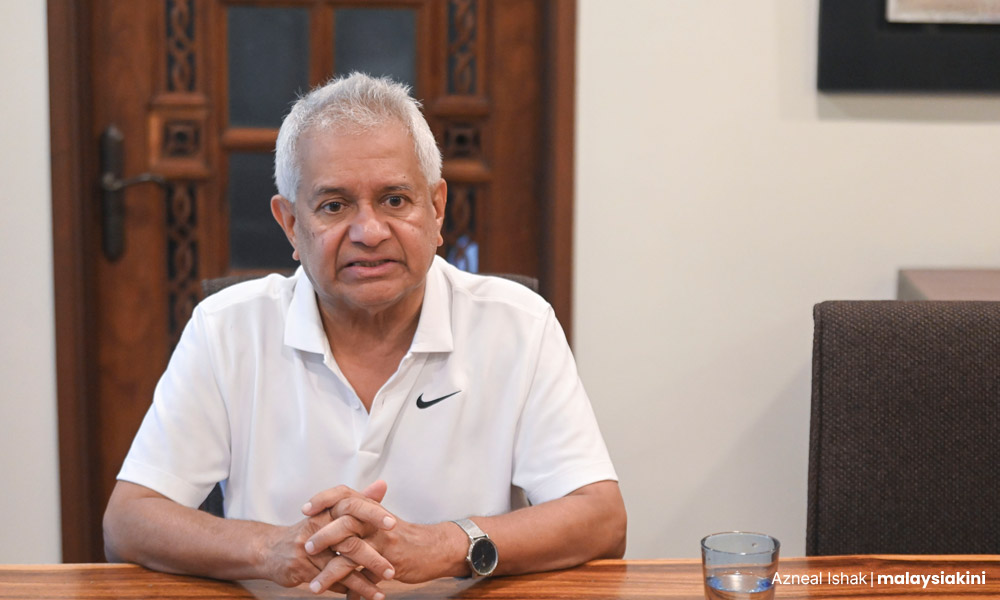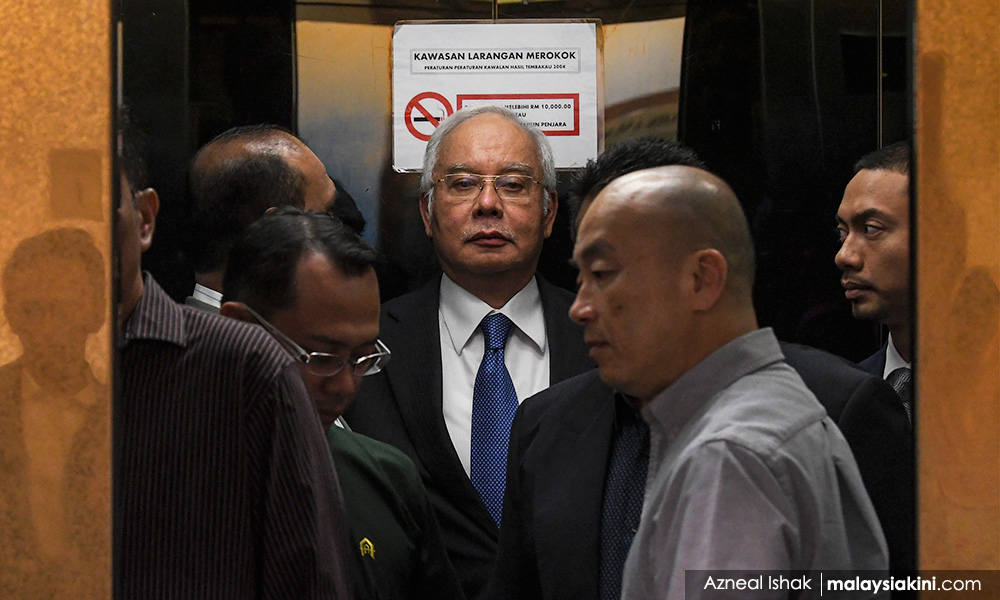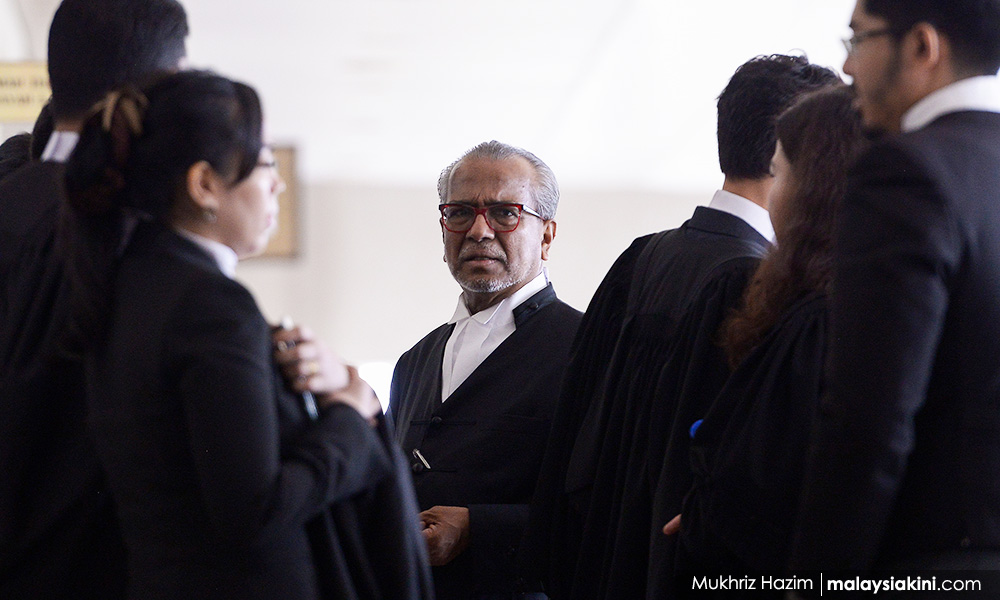EXCLUSIVE | Former attorney-general Tommy Thomas, who initiated prosecutions for the Najib Abdul Razak trials, finally broke his silence in this exclusive interview with James Chai and P Gunasegaram. He spoke extensively and frankly on the SRC International trial where former prime minister Najib was found guilty of seven charges of abuse of power, criminal breach of trust and money laundering involving RM42 million.
It was a trial filled with delay and drama, anxiety and agony, acrimony and accusation, politics and perception but after Najib was finally jailed, it turned into a huge debate about pardon and punishment.
Thomas takes us through each of the stages. In this first part of a four-part series, he talks about the background and how it all began. Part 2 will discuss the court processes of the trial and the inordinate delays, Part 3 the Federal Court decision and its implications, and finally, Part 4 will talk about the pardon process.
After Pakatan Harapan came into power in May 2018 and Thomas was appointed attorney-general, a number of corruption charges against politicians and others were initiated. Besides Najib, they include Najib's wife Rosmah Mansor, Ahmad Zahid Hamidi, Ahmad Maslan, Abdul Azeez Abdul Rahim, Tengku Adnan Tengku Mansor and Bung Moktar Radin.
Malaysiakini: What led you to first choose SRC as the first case to prosecute? Was it the most straightforward from a legal point of view?
Tommy Thomas: To some extent, the choice was made for me because lawyers have to depend on instructions and, in this case, investigation papers.
So imagine the DPPs (deputy public prosecutors) and myself as lawyers looking at documents given by somebody else. In this case, it was the MACC investigations, as opposed to other agencies. And MACC said that the file they were working on in the past was SRC (International). They confirmed the rumours circulating in KL (Kuala Lumpur), which was around the time one of my predecessors, Abdul Gani Patail, who was sacked in July 2016 that MACC were quite advanced in investigating SRC, so it was just carrying on that work.
That was the principal factor - the file came to me. As it turned out, fortuitously, SRC was the easiest to prove, because if you stripped it of everything, it was just a theft of RM42 million. So, it was easy to prove.

You handled the case initially and later on passed it to an external prosecutor. What’s your rationale for choosing external prosecutors and not someone from within (the AG’s Chambers)?
Among the first things I did was to form two 1MDB teams within one or two days of starting my work, divided into criminal and civil. That was the position when we charged on July 4, 2018. It was all in-house at that point.
The first two or three appearances in court were exclusively with DPPs. And then it became clear that this case had a lot of documents. The documentation was voluminous, which is good as it helps to prove the case, but you needed to have lawyers who could master these documents. And it is not just reading them and trying to understand. You need to get the context and have experience in handling corporate, commercial and financing fraud. Lawyers who have experience in dealing with such cases would understand the problem much better.
And that was the reason I decided to secure external counsel. I made the announcement on Merdeka Day, Aug 31, 2018, that we appointed Sulaiman (Abdullah) to do SRC, and (Gopal) Sri Ram for 1MDB cases and other matters. SRC, technically, is not part of 1MDB. It is separate. But for easy reference, everybody has put it as part of the 1MDB fraud, but strictly speaking, it was not part of 1MDB.
I was determined to get the best and the brightest. To me, it did not matter where the lawyer hails from. The public and private divide didn’t make sense. I was there on behalf of the people of Malaysia, and Malaysia deserved the best lawyers. Just like when Covid-19 happened, no one said that the best doctors of Malaysia and the best hospitals of Malaysia, whether public or private sector, should not be cooperating for the health and well-being of Malaysians. So to me, that was the uppermost consideration. I wanted to get the best and the brightest lawyers.
You mentioned that, from a legal standpoint, this SRC case was the easiest, and one of the reasons was because the documents were very complete, which meant that the minutes of meetings and bank statements were all there. Is it common for any criminal or civil cases for there to be so many contemporaneous documents?
Well, I can’t generalise, but certainly for all the cases that I prosecuted, which were Najib’s five cases, the other politicians, and Rosmah’s (Mansor, Najib’s wife) - let’s say there were 15 or 20 of those types of cases which I personally decided, there was much documentation.
What do you mean by these contemporaneous documents?
Let’s take the KWAP (civil services pension fund Kumpulan Wang Persaraan) money. As you recall, SRC was a company with a paid-up capital of RM2. The crooks needed to borrow, and so KWAP, the pension fund, was targeted to lend RM4 billion.
And KWAP quite rightly said on a credit risk basis, we cannot lend even RM10 to this company as it had no paid-up capital and no track record. That was when KWAP was convinced (to lend) with the government guarantee, and once the government guarantee for RM4 billion came, it became risk-free. This is what happened, the RM4 billion was loaned by KWAP, against the government guarantee.

Contemporaneous documents mean cabinet minutes, letters passing between SRC and KWAP, and KWAP minutes, resolutions by SRC (as SRC is a company) and bank payment slips. All these things would be prepared by the bankers and officers working in government and the company doing their duties in the ordinary course of their business.
You mean documents backing the deal?
Yes. And courts always place weight on contemporaneous documents as the court assumes that, when people are preparing them, they are, at that stage, truthful. They may have dishonest intentions later, but it is usually safe to assume that when one creates a contemporaneous document, it is truthful and can be relied on. It is difficult to oppose contemporaneous documents if one signed them.
When appointing external prosecutors, was there any opposition from those within the AGC? The external prosecutors were pro bono, weren’t they?
Well, not really. No opposition at the initial stages. Sulaiman, the DPPs liked very much - a lot of them were taught by him. And Sri Ram, whom they respected, so there was no problem with either of them. Both Sulaiman and Sri Ram acted pro bono, that is, without a fee.
And then (V) Sithambaram came to replace Sulaiman, who was not very well and just could not take on a large case like this.
Initially, Sitham was also pro bono - we paid for his airfare and hotel, as his practice is from Penang. But as (the case) became much more complex and longer than we thought, we decided to pay him. We paid him from halfway through the High Court. I assume this practice is carried on in the Court of Appeal and the Federal Court.
There was no opposition at all. I think the opposition, if any from the AGC, would be if we carried on appointing many more (from outside). So, in all other prosecutions, like the Perak DAP rape case in Ipoh, the Chandra Muzafar’s daughter case, the Johor Bahru bus case, a few inquests, that is, newsworthy ones (some of which I handled) were all conducted by DPPs.
At the start of the prosecution of Najib’s SRC case, I remember you wanted to hold press conferences after every proceeding, but then you decided to stop when there were a lot of Najib supporters disrupting your press conferences. I remember the time you stopped, but at the same time, (Muhammad) Shafee (Abdullah - Najib’s lawyer) in every proceeding, was very much stating their opinions on what the judges had carried out. From your point of view, did Shafee’s press conferences affect public opinion at all?
Traditionally, lawyers don’t like to talk about their cases. In fact, there is a prohibition on barristers talking about their cases, certainly in the Bar. And the DPPs are all very conservative and cautious, and don’t want to talk about their cases, so that was what it would be for a normal case.

But in a national interest case like this (and there was no other case of greater public interest than a former prime minister being charged) the public interest demand was great. Secondly, as you said, Shafee and his defence team were always holding press conferences, so we thought that if we don’t counteract, they might win the public debate by default. We did not wish to surrender in the court of public opinion.
So that is why we decided to have it. And we discussed it with our team, but none of the DPPs wanted to hold press conferences. I said, I would do the first one and then pass it on, since I never liked to talk about my cases. So I did it once and, of course, was hounded because I did not speak in Bahasa, and that hastened my decision not to comment publicly any further.
And then we managed to convince Sitham. So Sitham took over and did it throughout, to give the prosecution’s version of what took place each day, so the media had both. Then it is up to the media to decide what they want. That was what happened.
Were there any particular difficulties in prosecuting Najib? Anything that posed any kind of difficulty, considering this was a former prime minister, top politician, an Umno president?
Well, we were very clear in our mind, that is, the legal team, that this was just another case, and treated it like any other case. It did not matter who the accused was.
I said this in my opening speech at trial - and every time I talked about it, I emphasised it - which was that Article 8 of the Federal Constitution is relevant. Article 8(2) talks about the equality of all Malaysians (and foreigners who live in Malaysia) being treated equally before the law.
And once you accept that, and it is fundamental to our case and throughout our preparation and to our presentation, he is no different from any other accused. He and his lawyers may have talked about entitlement and other rights, but as far as we were concerned, he was just like any other accused.
Did you come under any political pressure at all?
No, absolutely not, we were given a free hand.
- Mkini



No comments:
Post a Comment
Note: Only a member of this blog may post a comment.